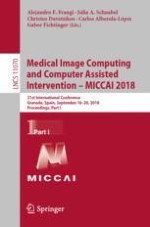2018 | OriginalPaper | Buchkapitel
Stochastic Deep Compressive Sensing for the Reconstruction of Diffusion Tensor Cardiac MRI
verfasst von : Jo Schlemper, Guang Yang, Pedro Ferreira, Andrew Scott, Laura-Ann McGill, Zohya Khalique, Margarita Gorodezky, Malte Roehl, Jennifer Keegan, Dudley Pennell, David Firmin, Daniel Rueckert
Erschienen in: Medical Image Computing and Computer Assisted Intervention – MICCAI 2018
Aktivieren Sie unsere intelligente Suche, um passende Fachinhalte oder Patente zu finden.
Wählen Sie Textabschnitte aus um mit Künstlicher Intelligenz passenden Patente zu finden. powered by
Markieren Sie Textabschnitte, um KI-gestützt weitere passende Inhalte zu finden. powered by
